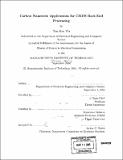Carbon nanotube applications for CMOS back-end processing
Author(s)
Wu, Tan Mau, 1979-
DownloadFull printable version (5.968Mb)
Other Contributors
Massachusetts Institute of Technology. Dept. of Electrical Engineering and Computer Science.
Advisor
L. Rafael Reif.
Terms of use
Metadata
Show full item recordAbstract
Carbon nanotubes are a recently discovered material with excellent mechanical, thermal, and electronic properties. In particular, they are potential ballistic transporters and are theorized to have thermal conductivities greater than any other material currently known. In this thesis, we will examine two possible applications of carbon nanotubes in CMOS back-end processing. The first application is as a replacement for copper interconnects. As interconnect line widths shrink, the electrical resistivity of copper will rise dramatically due to surface scattering effects. Carbon nanotube ballistic transporters may be able to overcome this obstacle, as well as being able to withstand current densities much greater than copper. The second application is an enhanced thermal conductivity dielectric for thermal management purposes. Carbon nanotube-oxide composites demonstrate improved thermal characteristics, and integration into CMOS technology may be able to alleviate some of the heat-removal and distribution problems future integrated circuits will face. We will also examine some of the processing techniques that will be necessary for carbon nanotube commercial deployment. Some of the issues we will discuss are nanotube growth, purification, and separation. In addition, we will consider some of the specific issues that need to be addressed for carbon nanotube integration into CMOS back-end technology, such as in situ growth and self-assembly.
Description
Thesis (S.M.)--Massachusetts Institute of Technology, Dept. of Electrical Engineering and Computer Science, February 2005. Includes bibliographical references (p. 73-75).
Date issued
2005Department
Massachusetts Institute of Technology. Department of Electrical Engineering and Computer SciencePublisher
Massachusetts Institute of Technology
Keywords
Electrical Engineering and Computer Science.